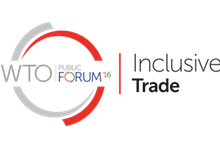Bridging the digital divide to facilitate Inclusive global trade
27 Sep 2016 06:00h - 17:30h
Event report
[Read more session reports and live updates from the 2016 WTO Public Forum.]
This session, organised by Huawei Technologies, focused on how global trade rules can facilitate bridging the digital divide. It discussed trends in the digital economy and the kind of rules-based system it needs in order to continue being an engine of global and inclusive economic growth.
James K. Lockett, Vice-President for Trade Facilitation and Market Access at Huawei Technologies, moderated the session by asking questions on promotion of the digital economy, legislation barriers on trade, and challenges faced by small medium enterprises (SMEs) in digital trade.
Okechukwu E. Enelamah, Honourable Minister of Industry, Trade & Investment of Nigeria, stated that long-term commitment is required for success in the digital economy. Enelamah said that both the country and the government need to benefit from cooperation of the public and private sectors. Having a large population of young people is an advantage for the digital economy and creating an environment for them to work in the digital economy is vital. Public Private Partnerships need to bring visible benefits to Nigeria as they can strengthen security, reduce corruption, and improve the country’s economy.
Hosuk Lee-Makiyama, Director of the European Centre for International Political Economy (ECIPE), talked about trade barriers and legislation. Although most countries are members of the WTO, many of them need to adopt new trade regulations. In the past, policies focused on supply, as businesses created supply for consumers. Nowadays, as businesses prioritise the demand market, policies are now emphasising demand. Thus, trade policies have changed, and supply chains are fragmented. Creating a business environment that facilities trade rules, understands their application, and attracts investment is essential.
Marcos Vaena, Chief, Enterprise Competitiveness at the International Trade Centre, discussed the challenges faced by SMEs. Although there is connectivity between SMEs, they lack awareness and knowledge of payments and logistic solutions. Limitations on broadband access and lack of trust are two barriers that SMEs encounter.
Usman Ahmed, Head of Global Public Policy at PayPal Inc., mentioned a survey of small businesses using Paypal. The revenue of small businesses that trade globally has doubled. These businesses are primarily service industries that mainly use the Internet to trade.
Pierre Sauvé, Director of External Programs and Academic Partnerships and a faculty member at the World Trade Institute, indicated that there were fewer trade agreements in the past compared to the present day. He mentioned that digital trade policies have advanced in privacy, consumer protection, and freedom to trade. He believes that in order to close the digital divide, not only policies on trade, but also policies on multi-layered governance are required.
The Q&A session discussed whether to open trade data to the public, the needs for standards for partnerships, and net neutrality. The issue of interfering with regulations on digital and cyber issues by requiring policies on digital trade was raised at the end of session. The panellists concluded that the Internet should be opened for trade to all businesses, which should also enjoy freedom to exchange data in digital trade.
by Aye Mya Nyein
Related topics
Related event

